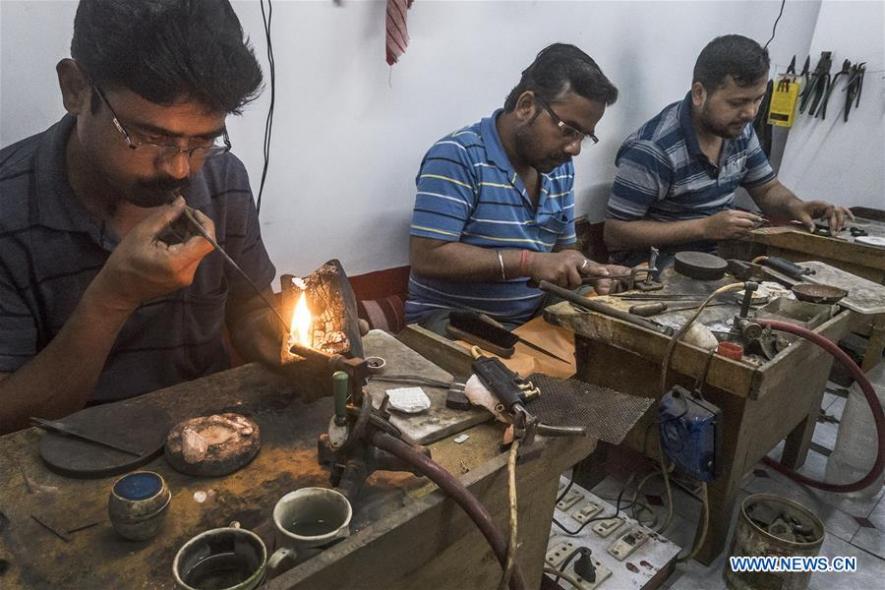COVID-19: Pessimism Pervades Jewellery Trade, Exodus of Karigars Continues

Workers make gold jewellery at a workshop in Kolkata, Workers make gold jewellery at a workshop in Kolkata.
Kolkata: A sense of pessimism pervades the domestic gem and jewellery business currently as state after state enforces stricter lockdown norms with an increasing number of people testing positive for the coronavirus.
The jewellery trade’s earlier assessment that things might look up latest by June has gone awry. Those who are more pessimistic seem to have concluded that the remainder of 2020 does not hold any hope. The section that still nurtures some hope, while being generally pessimistic, are inclined to believe that by Navratri, they may have reasons to cheer.
These findings have been derived from the interaction NewsClick has had over the last three days with stakeholders located in Kolkata, Mumbai, New Delhi, Bengaluru, Hyderabad and Chennai.
Resumption of business initially will have to be with the finished ornaments held in stock. Replenishment of stocks and execution of fresh orders will substantially depend on the return of the thousands of Bengali karigars who left their workplaces for their native places during the lockdown. A vast majority of them hail from Paschim Medinipur, Purba Medinipur, Howrah and Hooghly districts of West Bengal.
“The mood clearly is one of despondency. Uncertainties continue to multiply as fresh cases of people testing positive are being detected in several cities and towns. I have heard of some owners in some places opening their showrooms, but transactions have been negligible. People are not able to overcome their fear. For the business owners, the fear is that when the sentiment improves and demand for jewellery looks up, there may be a serious shortage of karigars. So, the return of the karigars is a prerequisite to witness normalcy when the business prospects brighten,” said the chairman of All India Gem And Jewellery Domestic Council (GJC), Anantha Padmanabhan, while speaking to NewsClick.
Padmanabhan also noted that jewellery buying may not necessarily merit priority even when the situation turns somewhat favourable. “We have to factor this in,” he added.
Samar De, who heads the Kolkata-based Swarnashilpi Bachao Samiti, lamented that despite fervent appeals by well-known economists and others well conversant with remedies that situations like the present one warrant, New Delhi has not offered cash assistance to the vulnerable sections. “Our karigars badly need cash, but the well-intentioned advice of economists has fallen on deaf ears. Survival of our businesses is at stake. It’s a paradox that while huge quantities of gold lie idle with temple authorities, the country merrily imports gold. The Centre should work out arrangements with the temple trusts for putting their gold to commercial use and cutting down on imports. Compensation to the temple trusts should be part of the package,” De suggested. “I can’t instantly recall when did we last face such a difficult phase in our business,” he added.
For president of Mumbai-based Goldsmith Coordination Committee, Rajaram Mahadeo Deshmukh, a new task at hand was to organise a sort of “reverse migration”, that is, facilitating return of an estimated 5,000 karigars to Maharashtra’s Sangli, Satara and Solapur districts from West Bengal. Deshmukh told NewsClick that he was able to bank on the cooperation of veteran politician Sharad Pawar and through him, of Mamata Banerjee for this task.
In Mumbai, the authorities have allowed Zaveri Bazar to remain open, but along with low footfall, there is major dearth of workers. In Deshmukh’s reckoning, Mumbai-based karigars who went back to their native places in West Bengal are unlikely to return soon.
President of Karnataka Bengali Swarnashilpi Association Sushil Mondol said, of late, departures for native places are showing a marked uptrend, compared to what it was in the initial lockdown phases. This is attributable to the apprehension among the karigars with the number of new COVID-19 cases rising by the day.
Mondol does not see business reviving anytime soon and he, therefore, has ruled out the possibility of catering to the fresh orders during the festive season that kicks off in a matter of weeks. “Circumstances are forcing us to virtually skip Viswakarma and Durga pujas, which are important events in our calendar. Only the bare minimum rituals will be observed this time around,” he said.
Secretary of Hyderabad Bengali Goldsmith Association, Mahitosh Jana, said that out of an estimated 50,000 karigars, already about 40,000 have left and “about 5,000 more are seriously considering returning to their native places in West Bengal”.
The prevailing circumstances are depressing. “The festive season is approaching and we normally see good demand for temple jewellery which devotees offer as part of their rituals. Also, we cater to the demand for jewellery in which costly stones are used as per the customers’ design preferences. The prospective buyers, who naturally include affluent people, are keeping silent this time around,” Jana told NewsClick, adding that their Durga Puja celebrations this year will be on a much smaller scale.
Bibhas Maity, who owns a shop in New Delhi’s Karol Bagh and who is actively associated with Delhi Swarnakar Sangh [affiliated to Akhil Bharatiya Swarnakar Sangh (ABSS)], said that about 80% of the 50,000-strong artisan community has left for their native places in West Bengal. Unfortunately, jewellery units are not getting the benefits that the Centre has announced for the MSME sector. Maity, who is additional general secretary of ABSS, said that they are totally in the dark about when the situation will normalise and when karigars will return. “In view of the pronounced downturn in our business, this year we will spend the bare minimum on Durga Puja and other cultural activities,” he said.
Also read: The Merits of Medicare for All Have Been Proven by This Pandemic
A senior functionary at GJC, Mitesh Dhorda, is of the view that the pandemic has badly shaken the sentiment of the jewellery trade, on which depends the livelihood of lakhs and lakhs of karigars and other workers. The disenchantment is palpable, Dhorda points out.
In the context of the pandemic’s crippling impact on the jewellery trade, GJC has sought urgent consideration by the authorities of their pending demands. Similar to the working capital loan, the gold metal loan (GML) should be rolled over on paper based on risk assessment and credit rating. Thus, GMLs maturing in the next 180 days should be rolled over by an additional 180 days. GJC has cited an expert committee’s favourable suggestion in this regard.
Market trends point to excessive speculation over gold prices because of perceived economic uncertainties resulting from heightened fears over the pandemic. The unusual price spurt has caused a rise in the margin requirements. Jewellers have been getting margin calls from their banks with the advice to act fast. If margin requirements are not met, banks call for a close-out of the open positions. The moment close-out is declared, jewellers will have to close the positions at gold’s current market price.
Banks will treat failure to pay margin call money as a default. As the situation is grave, the trade has sought deferment of margin calls by at least another 180 days post-April 30, 2020. If banks cannot accommodate, the specific amount should be converted into a loan, which should be provided as credit at minimal interest and with repayment tenure of a year.
The sector wants the Union government to remove gold from the purview of section 2 (14) of the Income Tax Act, which treats the yellow metal as a capital asset. Therefore, the sale of jewellery and gold bars are subject to capital gains tax. This explains the tendency to store gold. If families can be incentivised to dispose of a part of their holdings that lie idle, supplies of the yellow metal will increase and consequently, it will be possible to pare imports. Therefore, the Centre should amend the definition of the capital asset and exclude gold from Section 2 (14) of the Income Tax Act, 1961.
There are some other demands. The member lending institutions (MLI) notified under the guaranteed emergency credit line scheme include scheduled commercial banks, financial institutions recognised by the Reserve Bank of India and non-banking financial companies that have been in operation for two years as on February 29, 2020. A significant omission is that of cooperative banks as eligible lenders. Many micro, small and medium enterprises (MSME), of which jewellery units constitute a significant chunk, are located in distant areas and they suffer as they cannot access credit facilities.
This has been confirmed in the findings of an inter-ministerial committee for accelerating manufacturing in the MSME sector and it, therefore, recommended the inclusion of cooperative banks as lending institutions for MSME units. The jewellery trade wants the Centre to amend the provision to include cooperative banks.
The trade has also pointed out certain inconsistencies in respect of the qualifying threshold for MSMEs. Under the MSME Development Act, 2006, the definition has been recently revised to provide a classification of units with a turnover of up to Rs 250 crore as MSMEs. Before the upward revision, the eligibility criteria were turnover of up to Rs 100 crore and outstanding loans of up to Rs 25 crore.
The uncertainty arose in respect of units with a turnover in excess of Rs 100 crore. The trade has, therefore, suggested that the eligibility criteria should be rationalised to remove the dual qualifying criteria and allow MSMEs with either a turnover of Rs 250 crore or an outstanding debt of up to 25 crore to be eligible for benefits under the guaranteed emergency credit line scheme, which is intended to grant a new lease of life to the MSME sector. The number of registered MSMEs is placed at six crore which includes four lakh registered jewellers.
ABSS, in a representation to the Union Finance Ministry, has sought the creation of a Rs 15,000 crore corpus to bail out the gold and silversmith industry, which finds itself in dire straits.
Also read: The Migrant as Citizen
Get the latest reports & analysis with people's perspective on Protests, movements & deep analytical videos, discussions of the current affairs in your Telegram app. Subscribe to NewsClick's Telegram channel & get Real-Time updates on stories, as they get published on our website.
























